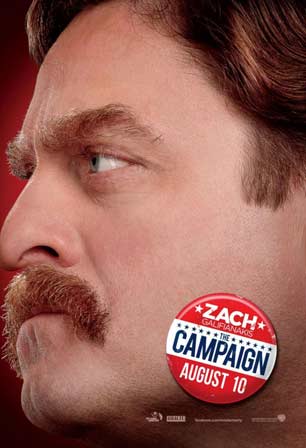In The Campaign, out this weekend, Will Ferrell plays an incumbent Congressman who’s running what’s supposed to be an uncontested race, when a pair of wealthy brothers by the name of Motch put up a genial dummy, played by Zach Galifianakis, to run against him. Unsurprisingly, Galifianakis confirmed that the brothers, played in the movie by Dan Aykroyd and John Lithgow, are meant to be a stand-in for the real-life industrialists and right-wing political funders Charles and David Koch, and mentioned in a recent interview that he found the pair “creepy.”
Other public figures might consider the movie, and Galifianakis’ uneasiness about their influence to be a tribute to their effectiveness. But the Kochs don’t seem to be taking it that way. Phillip Ellender, Koch Industries’ president for government affairs, issued a statement on the brothers’ behalf, saying:
Last we checked, the movie is a comedy. Maybe more to the point is that it’s laughable to take political guidance or moral instruction from a guy who makes obscene gestures with a monkey on a bus in Bangkok…We disagree with his uninformed characterization of Koch and our beliefs. His comments, which appear to be based on false attacks made by our political opponents, demonstrate a lack of understanding of our longstanding support of individual freedom, freedom of expression, and constitutional rights.
While the Koch brothers have become a staple of political coverage, it’s taken longer for them to become fixtures in popular culture, and Ellender’s response suggests they’re not enjoying the attention. This summer, they’ve made an appearance by name in Aaron Sorkin’s HBO drama The Newsroom, when anchor Will McAvoy (Jeff Daniels) attacked guests on his show who were members of Tea Party groups for not being aware of who their funders were. His coverage earned a rebuke from network owner Leona Lansing (a scenery-munching Jane Fonda), who cautioned Will’s producer against further coverage of the Kochs less they pull their brands’ advertisements from the company. declared “I got where I am by knowing who to fear,” she said. “They drop Brinks trucks on people they disagree with.” It was a weirdly sinister portrayal, in contrast to the lighter satire The Campaign is expected to offer up.
But as long as the Koch brothers are making heavy investments in political campaigns and grass-roots organizing, they’re probably going to keep popping up in movies and television, at least until someone gets the idea of painting casino magnate Sheldon Adelson as a malevolent power behind the throne, which will probably take Adelson deciding to support someone more credible than Newt Gingrich. Until then, Charles and David Koch might as well enjoy the spectacle of liberals fearing them, and the debate over which one of them Aykroyd and Lithgow are each meant to be.
Join us in defending the truth before it’s too late
The future of independent journalism is uncertain, and the consequences of losing it are too grave to ignore. To ensure Truthout remains safe, strong, and free, we need to raise $43,000 in the next 6 days. Every dollar raised goes directly toward the costs of producing news you can trust.
Please give what you can — because by supporting us with a tax-deductible donation, you’re not just preserving a source of news, you’re helping to safeguard what’s left of our democracy.
